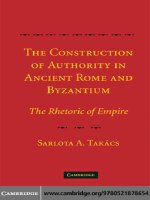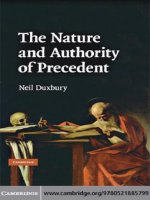052187887X cambridge university press the sovereignty of law the european way jul 2007
Bạn đang xem bản rút gọn của tài liệu. Xem và tải ngay bản đầy đủ của tài liệu tại đây (599.61 KB, 179 trang )
This page intentionally left blank
Recently, the role of courts has changed dramatically. Not only do
courts now have to decide cases between parties, they also often
have to choose between competing fundamental values. Judges may
have to balance the potentially conflicting interests of human life
and human dignity; freedom of speech and the right of privacy; or
free trade and the protection of the environment. The courts may
have to circumscribe freedom of religion, and decide when
religious dress may be worn.
With the non-specialist in mind, and starting from the basic
notion of the rule of law, this book explores how judges can and
should address such issues. Both the European Convention on
Human Rights and the European Union often play a decisive role,
and the book points out both the advantages and the difficulties
posed by this. Above all, it seeks to promote a more informed
debate.
SIR FRANCIS JACOBS, KCMG, QC is Professor of Law at King’s
College London. Between October and January he was
Advocate General at the European Court of Justice. Prior to that, he
was Director of the Centre of European Law at King’s College
London from to , and Professor of European Law in the
University of London from to . He was also in practice at
the English Bar, and appeared frequently as Queen’s Counsel at the
European Court of Justice. He is a Bencher of the Middle Temple.
THE SOVEREIGNTY OF LAW:
THE EUROPEAN WAY
By FRANCIS G. JACOBS
Professor of Law, King’s College London
and Jean Monnet Professor
Formerly Advocate General, Court of Justice of the European
Communities (–)
CAMBRIDGE UNIVERSITY PRESS
Cambridge, New York, Melbourne, Madrid, Cape Town, Singapore, São Paulo
Cambridge University Press
The Edinburgh Building, Cambridge CB2 8RU, UK
Published in the United States of America by Cambridge University Press, New York
www.cambridge.org
Information on this title: www.cambridge.org/9780521878876
© Francis Jacobs 2007
This publication is in copyright. Subject to statutory exception and to the provision of
relevant collective licensing agreements, no reproduction of any part may take place
without the written permission of Cambridge University Press.
First published in print format 2007
eBook (EBL)
ISBN-13 978-0-511-29511-9
ISBN-10 0-511-29511-1
eBook (EBL)
ISBN-13
ISBN-10
hardback
978-0-521-87887-6
hardback
0-521-87887-X
ISBN-13
ISBN-10
paperback
978-0-521-70385-7
paperback
0-521-70385-9
Cambridge University Press has no responsibility for the persistence or accuracy of urls
for external or third-party internet websites referred to in this publication, and does not
guarantee that any content on such websites is, or will remain, accurate or appropriate.
The Hamlyn Trust [vi]
The Hamlyn Lectures [ix]
Preface [xii]
Introduction []
The rule of law in Europe []
The European Convention on Human Rights and the
rule of law []
The European Union and the rule of law []
Fundamental values []
Courts and free markets []
The European Union today: some achievements []
The European Union today: some problems []
Afterword []
Index []
v
The Hamlyn Trust owes its existence today to the will of the
late Miss Emma Warburton Hamlyn of Torquay, who died in
at the age of . She came of an old and well-known
Devon family. Her father, William Bussell Hamlyn, practised
in Torquay as a solicitor and J.P. for many years, and it seems
likely that Miss Hamlyn founded the trust in his memory.
Emma Hamlyn was a woman of strong character, intelligent
and cultured, well-versed in literature, music and art, and a
lover of her country. She travelled extensively in Europe and
Egypt, and apparently took considerable interest in the law and
ethnology of the countries and cultures that she visited. An
account of Miss Hamlyn by Professor Chantal Stebbings of the
University of Exeter may be found, under the title ‘The
Hamlyn Legacy’, in volume of the published lectures.
Miss Hamlyn bequeathed the residue of her estate on
trust in terms which it seems were her own. The wording was
thought to be vague, and the will was taken to the Chancery
Division of the High Court, which in November approved
a Scheme for the administration of the trust. Paragraph of the
Scheme, which follows Miss Hamlyn’s own wording, is as
follows:
The object of the charity is the furtherance by lectures or
otherwise among the Common People of the United
Kingdom of Great Britain and Northern Ireland of the
vi
knowledge of the Comparative Jurisprudence and
Ethnology of the Chief European countries including the
United Kingdom, and the circumstances of the growth of
such jurisprudence to the Intent that the Common People
of the United Kingdom may realise the privileges which in
law and custom they enjoy in comparison with other
European Peoples and realising and appreciating such
privileges may recognise the responsibilities and
obligations attaching to them.
The Trustees are to include the Vice-Chancellor of the
University of Exeter, representatives of the Universities of
London, Leeds, Glasgow, Belfast and Wales and persons
co-opted. At present there are eight Trustees:
Professor N. Burrows, The University of Glasgow
Professor I.R. Davies, Swansea University
Ms Clare Dyer
Professor K.M. Economides [representing the Vice-Chancellor
of the University of Exeter] (Chairman)
Professor J. Morison, Queen’s University, Belfast
The Rt Hon. Lord Justice Sedley
Professor A. Sherr, University of London
Professor C. Walker, University of Leeds
Clerk: Ms Charlotte Blackwell, University of Exeter
From the outset it was decided that the objects of the Trust
could be best achieved by means of an annual course of public
lectures of outstanding interest and quality by eminent lecturers, and by their subsequent publication and distribution to a
wider audience. The first of the Lectures were delivered by the
Rt Hon. Lord Justice Denning (as he then was) in . Since
vii
then there has been an unbroken series of annual Lectures
published until by Sweet & Maxwell and from by
Cambridge University Press. A complete list of the Lectures
may be found on pages ix to xii. In the Trustees decided
to supplement the Lectures with an annual Hamlyn Seminar,
normally held at the Institute of Advanced Legal Studies in the
University of London, to mark the publication of the Lectures
in printed book form. The Trustees have also, from time to
time, provided financial support for a variety of projects
which, in various ways, have disseminated knowledge or have
promoted to a wider public understanding of the law.
This, the th series of lectures was delivered by Sir
Francis Jacobs, KCMG, QC at the University of Glasgow,
Exeter University and King’s College London during October
. The Board of Trustees would like to record its appreciation to Sir Francis and also to the three University law schools,
which generously hosted these Lectures.
February
viii
KIM ECONOMIDES
Chairman of the Trustees
Freedom under the Law by the Rt Hon. Lord Denning
The Inheritance of the Common Law by Richard
O’Sullivan
The Rational Strength of English Law by Professor
F.H. Lawson
English Law and the Moral Law by Professor
A.L. Goodhart
The Queen’s Peace by Sir Carleton Kemp Allen
Executive Discretion and Judicial Control by Professor
C.J. Hamson
The Proof of Guilt by Professor Glanville Williams
Trial by Jury by the Rt Hon. Lord Devlin
Protection from Power under English Law by the
Rt Hon. Lord MacDermott
The Sanctity of Contracts in English Law by Professor
Sir David Hughes Parry
Judge and Jurist in the Reign of Victoria by C.H.S.
Fifoot
The Common Law in India by M.C. Setalvad
British Justice: The Scottish Contribution by Professor
Sir Thomas Smith
Lawyer and Litigant in England by the Rt Hon. Sir
Robert Megarry
Crime and the Criminal Law by the Baroness Wootton
of Abinger
ix
Law and Lawyers in the United States by Dean Erwin
N. Griswold
New Law for a New World? by the Rt Hon. Lord Tanley
Other People’s Law by the Rt Hon. Lord Kilbrandon
The Contribution of English Law to South African Law:
and the Rule of Law in South Africa by the Hon.
O.D. Schreiner
Justice in the Welfare State by Professor H. Street
The British Tradition in Canadian Law by the
Hon. Bora Laskin
The English Judge by Henry Cecil
Punishment, Prison and the Public by Professor Sir
Rupert Cross
Labour and the Law by Professor Sir Otto Kahn-Freund
Maladministration and its Remedies by Sir Kenneth
Wheare
English Law – the New Dimension by the Rt Hon. Lord
Scarman
The Land and the Development; or, The Turmoil and
the Torment by Sir Desmond Heap
The National Insurance Commissioners by Sir Robert
Micklethwait
The European Communities and the Rule of Law by
Lord Mackenzie Stuart
Liberty, Law and Justice by Professor Sir Norman
Anderson
Social History and Law Reform by Professor Lord
McGregor of Durris
Constitutional Fundamentals by Professor Sir William
Wade
x
Intolerable Inquisition? Reflections on the Law of Tax
by Hubert Monroe
The Quest for Security: Employees, Tenants, Wives by
Professor Tony Honoré
Hamlyn Revisited: The British Legal System Today by
Lord Hailsham of St Marylebone
The Development of Consumer Law and Policy – Bold
Spirits and Timorous Souls by Sir Gordon Borrie
Law and Order by Professor Ralf Dahrendorf
The Fabric of English Civil Justice by Sir Jack Jacob
Pragmatism and Theory in English Law by
P.S. Atiyah
Justification and Excuse in the Criminal Law by
J.C. Smith
Protection of the Public – A New Challenge by the
Rt Hon. Lord Justice Woolf
The United Kingdom and Human Rights by Dr Claire
Palley
Introducing a European Legal Order by Gordon Slynn
Speech & Respect by Professor Richard Abel
The Administration of Justice by Lord Mackay of
Clashfern
Blackstone’s Tower: The English Law School by
Professor William Twining
From the Test Tube to the Coffin: Choice and
Regulation in Private Life by the Hon. Mrs Justice Hale
Turning Points of the Common law by the Rt Hon. The
Lord Cooke of Thorndon
Commercial Law in the Next Millennium by Professor
Roy Goode
xi
Freedom Law and Justice by the Rt Hon. Lord Justice
Sedley
The State of Justice by Michael Zander QC
Does the United Kingdom still have a Constitution? by
Anthony King
Human Rights, Serious Crime and Criminal Procedure
by Andrew Ashworth QC
Legal Conundrums in our Brave New World by
Baroness Kennedy of the Shaws
Judicial Activism by the Hon. Justice Michael Kirby
AC CMG
Rights at Work: Global, European and British
Perspectives by Sir Bob Hepple QC, FBA
Can Human Rights Survive? by Conor Gearty
The Sovereignty of Law: The European Way by Sir
Francis Jacobs KCMG, QC
xii
This book is addressed, not primarily to the specialist, but to a
wider audience. It tackles some basic questions about the role
of law, and the courts, in a society ever more complex.
How has the law developed so that it now seems sometimes the final arbiter on social, ethical and political questions?
How does the law respond to these challenges? How
far, in particular, can the law reflect changing values? How far
can the law influence those values? What part can and should
be played by judges?
I have tried to examine these issues in a European
context, and in that context I look in particular at human
rights, and at the role of the European Union.
In doing so I have a broader aim, which is to promote
a more informed debate about European law.
Although European law is well served by specialists,
it suffers from a large information deficit among the wider
public. Indeed there seems to be more misinformation,
even in legal and professional circles, than a genuine attempt
to understand it. Both the place of human rights in our
society, and the role of the European Union, are subjects of
the greatest importance; yet they have become, in part, the
playthings of politicians. This is a damaging and dangerous
situation.
*
xiii
*
*
*
*
*
*
I am grateful to the Hamlyn Trustees for the invitation to
deliver the Hamlyn Lectures on which this book is based.
Professor Kim Economides, chairman of the trustees (and a
former student of mine), has been exceptionally helpful and
encouraging.
My thanks also for the hospitality received at the
University of Glasgow, the University of Exeter and King’s
College London where the lectures were delivered: in particular to Noreen Burrows, to John and Jean Usher and to
Raymond Plant and Piet Eeckhout respectively. I am grateful
also to Cambridge University Press, and in particular to Finola
O’Sullivan for her constant patience and encouragement.
My greatest debt is to my wife, Susan.
Francis G. Jacobs
xiv
Introduction
The functions of the law seem to have developed dramatically
since the days of Miss Emma Hamlyn.
What I seek to show in this book is that many fundamental choices for society are now made, and probably have to
be made, not by the legislature, not by the executive, but by the
courts. This requires the courts not merely to apply existing
legal rules, but to develop the law. In doing so, the courts will
necessarily be making value choices, and often balancing competing values, especially where they are confronted with conflicts between them.
For example, in the moral sphere, acute problems
arise on the ostensibly sacrosanct right to life: what is its scope?
The duty to protect and respect human life may conflict with
our conceptions of human dignity. What then should be the
response of the courts to the issue of euthanasia?
Many examples of competing values have their origin
in the idea of fundamental rights. Especially over the past fifty
years, it has become widely accepted in Europe that the protection of fundamental human rights is a principal function of
the courts. But often fundamental rights are not, despite the
language sometimes used, absolute and unqualified. Freedom
of speech may conflict with the right to privacy; currently,
there is vital debate about the limits on the fundamental right
to practise a religion. So the courts, necessarily, have to strike
the balance.
In the sphere of economic policy, we need again to
seek to balance competing values: we need to consider, for
example, how to reconcile free trade with employment protection, or with protection of the environment. Here too, as we
shall see, the courts have to take a leading role.
Choices between competing values thus have to
be made by the courts. But where do the values come from
– in an increasingly multicultural and pluralist society?
What role do values play, and should they play, in shaping
the law? And does the law, in turn, have a role in shaping
values?
In the past, it was assumed that fundamental decisions
were made by a sovereign ruler, and the rules applied by the
courts.
In recent years, as final decisions have become more
complex, as rules have been shown to be flexible, as principles have emerged to qualify the strict application of rules,
so sovereignty seems in some areas to have passed to the
courts, and we can speak, if not of the sovereignty of judges,
then perhaps of the sovereignty of law. Hence the title of
this book.
The theme raises many issues. Some of them, of
course, can only be outlined in this book, but they will, I hope,
encourage interest in, and debate on, issues of much importance for our society.
Let me then, I hope as an appetizer, outline some of
the questions which arise:
. Is it desirable that courts should have this role? And how far
is this role increasingly inevitable?
. What are the advantages of courts taking final decisions on
these issues? What are the difficulties, and what are the
dangers?
. How do courts take their decisions? How far are they, and
how far should they be, influenced by existing social values?
How far does the law, in turn, influence and help to form
social values?
. At what level should courts take these decisions: how far at
the national level, how far at the European level, how far at
the global level? To what extent can European answers be
given? How much can we learn from other European
systems? Or even seek global answers? To what extent
should courts look at the experience of courts elsewhere in
the world?
These questions arise from the changing functions of law, as
the courts have often found themselves to be the ultimate
arbiter where goals or values conflict.
In some legal systems this is by no means a novel
theme. In the United States, in particular, it has long been
taken for granted, and especially for the US Supreme Court.
The debates in the United States are rather about the processes
of reasoning by which courts should reach, and justify, their
decisions: should they, for example, seek to determine the
‘original intent’ of the US Constitution and seek to give effect
to that? Or should they treat the Constitution rather as an
evolving instrument, to be adapted to changing circumstances
and to changing values?
In the United Kingdom, by contrast, the role of the
courts in determining or shaping policy seems rather new.
Historically the most important issue was perhaps the issue of
sovereignty – or, in effect, whether the ‘sovereign’ was, by
apparent contradiction, subject to any legal limitations.
Sovereignty
For our purposes, sovereignty can be regarded, historically, as having two aspects: international and internal. In the
West, and in particular in Europe, there emerged after the
Middle Ages the concept of independent, ‘sovereign’ States:
countries which were not subject to legal rules in their dealings
with each other, other than the most basic rules which they
could be deemed to have accepted voluntarily. International
law, which regulated the behaviour of States, was confined to
‘customary’ law and treaties. Customary law was limited to
rudimentary principles which simply reflected the existing
practice of States: for example, the principle that treaties must
be observed (pacta sunt servanda). Treaties were pacts, or
agreements, which the State had concluded voluntarily and by
which it was bound by its own consent.
While States were sovereign in their international relations, it was also assumed that within each State there was a
‘sovereign’ law-maker, more or less unlimited by law.
Whatever may have been the case in the past, it seems
clear that sovereignty is no longer a viable concept for explaining either the role of the State in international affairs or the
internal arrangements of a modern State.
Internationally, it is not viable on the political level: no
State today, even the United States, is able to act independently.
Nor is it viable legally: all States actually accept today the
constraints of international law, although they may differ
about what it requires.
Internally, the traditional concept is equally defunct.
Partly, this is a consequence of the previous point: the powers
of the State, internally also, are limited by international constraints. But sovereignty is no longer a useful model even
where there are no external limits on domestic action.
Politically, it has been replaced by some form of the separation
of powers; often, with powers divided between legislature,
executive and judiciary. Legally, it is difficult, if not impossible,
to identify today a State in which a ‘sovereign’ legislature is not
subject to legal limitations on the exercise of its powers.
Moreover, sovereignty is incompatible, both internationally and internally, with another concept which also has a
lengthy history, but which today is widely regarded as a paramount value: the rule of law.
The rule of law
The notion of the rule of law also has a long and fascinating history.
The notion that there is a basic or fundamental law
(confusingly sometimes known as a higher law) can be
traced back for many centuries. The essential idea is that the
ordinary laws, even those made by the ‘sovereign’, are subject
to fundamental law, and can therefore be held invalid if they
transgress it.
If laws which conflict with the fundamental law are
invalid, the question then of course arises: by whom can the
laws be held invalid? The most prominent illustration again
comes, historically, from the US system, in the famous
Supreme Court case of Marbury v. Madison in .1 The US
Constitution contained no provision for judicial review of
legislation enacted by its supreme legislature, the US
Congress. But Chief Justice Marshall, finding a conflict
between a statute enacted by the US Congress and the
Constitution, considered it ‘the essence of judicial duty’ to
follow the Constitution.
This was a leading milestone on the road to what is
today called ‘constitutionalism’: the idea, found in those
systems which accept judicial review of legislation, that the
constitution – or equivalent constitutional principles – is the
fundamental law which entitles the courts to set aside even
the laws enacted by democratic legislatures.
Judicial review of the constitutionality of legislation
has a dual justification in the US system. First, there is the
notion of the Constitution as the supreme law, so that its rules
prevail over ordinary legislation. Second, there is the federal
system, under which powers are divided between the US
Congress and the State legislatures, each being the supreme
legislature (subject to the ultimate control of the courts)
within its own field of competence.
In turn, such a federal system almost inevitably, it
would seem, comports two consequences. First, because the
separate legislatures are coequal, there is no true ‘sovereign’ to
be located within the system. Second, there is a need for an
independent system of adjudication, to resolve disputes over
the respective competences of the ‘central’ legislature and the
11
Marbury v. Madison US ( Cranch) ().
State legislatures. That points to the need for a court with an
appropriate ‘constitutional’ jurisdiction.
In the United Kingdom, by contrast, there have traditionally been no legal limits on the sovereignty of Parliament:
even today, the only exceptions are those entailed by membership of the European Union. There is otherwise no judicial
review of Acts of Parliament; indeed the term ‘judicial review’
has been expropriated by administrative law to refer exclusively to review of the executive – a government minister, for
example, or a local authority where it is alleged that they have
acted unlawfully; and the expression ‘judicial review’ is now
used as a technical term to denote the application to the court
for a remedy for such unlawful administrative action.
The meaning of the rule of law
The rule of law is today universally recognized as a
fundamental value. But there is not universal agreement about
what it means. Nor is there agreement about how it can be
reconciled with other, competing values: notably, with the
requirements of democratic government.
There are two aspects of the rule of law: formal and
substantive. Formally, the principle requires that the exercise
of power – and thus all acts of the public authorities – is, with
narrow exceptions, subject to review by the courts to ensure
that the exercise was authorized by law. This aspect of the rule
of law is also known as the principle of legality.
I had intended to say a good deal, in this introductory
chapter, about the evolution of the substance of the rule of law
and its significance today. But on reflection, I prefer, if I can put
it that way, to let it speak for itself. What the rule of law involves
and requires will, I hope, emerge very clearly from this book.
It will certainly become clear that it cannot coexist
with traditional conceptions of sovereignty.
What I hope should result from this book is that the
rule of law embodies certain values which seem, at least in
Europe, widely accepted as essential to modern social and
political life; and that we shall be able to identify some of those
values.
But we shall look also at other areas where fundamental value choices have to be made by the courts.
The scope of our subject is therefore broad, but that
may be appropriate for the Hamlyn Lectures. And we may even
find that there are links that can be made between the values
embodied in the rule of law and other fundamental social and
ethical values which the courts have to take into account.
Finally, it is appropriate, today, to look at the United
Kingdom in its European setting. Both the European
Convention on Human Rights and European Community law
have given UK law a new dimension – as was anticipated by
Leslie Scarman in his Hamlyn Lectures ‘English Law – The
New Dimension’. I will suggest that the European dimension
has been, and remains, a valuable input, reinforcing the fundamental values of English law.
The rule of law in Europe
The two European systems: an outline
The two European systems I have referred to in the
previous chapter – the European Convention on Human
Rights and European Community law – are very different from
one another in their substance, and they operate in very
different ways. But each, as we shall see, has an important role
in reinforcing the rule of law; moreover, by a combination of
chance and design, they complement one another.
To summarize in the briefest terms: the European
Convention on Human Rights, first conceived in with
much input from the United Kingdom, is binding on the currently forty-six member States of the Council of Europe. The
European Court of Human Rights, based in Strasbourg, hears
cases brought mainly by individuals, occasionally by corporations, exceptionally even by governments, alleging breach of
the human rights guaranteed by the Convention. Cases can be
taken to Strasbourg only after all domestic channels of redress
have failed. The judgment of the Court, if it finds a breach, is
binding on the State against which it is given, and the Court
may award compensation.
The European Community, which had its origins also
in , now the European Union, is a union of currently
twenty-seven Member States. It was initially set up with primarily economic functions, but with political aspirations. It









